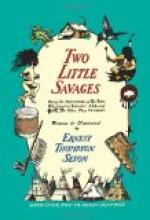“Le’s capture the little cuss, Yan.”
“An’ burn him at the stake with horrid torture,” was the rejoinder.
They set out in his direction, but again the appearance of Burns changed their war-party onslaught into a rapid retreat.
(More opprobrium.)
During the days that followed the boys were often close to the boundary, but it happened that Burns was working near and Guy had the quickest of eyes and ears. The little rat seemed ever on the alert. He soon showed by his long-distance remarks that he knew all about the boys’ pursuits—had doubtless visited the camp in their absence. Several times they saw him watching them with intense interest when they were practising with bow and arrow, but he always retreated to a safe distance when discovered, and then enjoyed himself breathing out fire and slaughter.
One day the boys came to the camp at an unusual hour. On going into a near thicket Yan saw a bare foot under some foliage. “Hallo, what’s this?” He stooped down and found a leg to it and at the end of that Guy Burns.
Up Guy jumped, yelling “Paw—Paw—PAW!” He ran for his life, the Indians uttering blood-curdlers on his track. But Yan was a runner, and Guy’s podgy legs, even winged by fear, had no chance. He was seized and dragged howling back to the camp.
“You let me alone, you Sam Raften—now you let me alone!” There was, however, a striking lack of opprobrium in his remarks now. (Such delicacy is highly commendable in the very young.)
“First thing is to secure the prisoner, Yan.”
Sam produced a cord.
“Pooh,” said Yan. “You’ve got no style about you. Bring me some Leatherwood.”
This was at hand, and in spite of howls and scuffles, Guy was solemnly tied to a tree—a green one—because, as Yan pointed out, that would resist the fire better.
The two Warriors now squatted cross-legged by the fire. The older one lighted a peace-pipe, and they proceeded to discuss the fate of the unhappy captive.
“Brother,” said Yan, with stately gestures, “it is very pleasant to hear the howls of this miserable paleface.” (It was really getting to be more than they could endure.)
“Ugh—heap good,” said the Woodpecker.
“Ye better let me alone. My Paw’ll fix you for this, you dirty cowards,” wailed the prisoner, fast losing control of his tongue.
“Ugh! Take um scalp first, burn him after,” and Little Beaver made some expressive signs.
“Wah—bully—me heap wicked,” rejoined the Woodpecker, expectorating on a stone and beginning to whet his jack-knife.
The keen and suggestive “weet, weet, weet” of the knife on the stone smote on Guy’s ears and nerves with appalling effect.
“Brother Woodpecker, the spirit of our tribe calls out for the blood of the victim—all of it.”
“Great Chief Woodpecker, you mean,” said Sam, aside. “If you don’t call me Chief, I won’t call you Chief, that’s all.”




